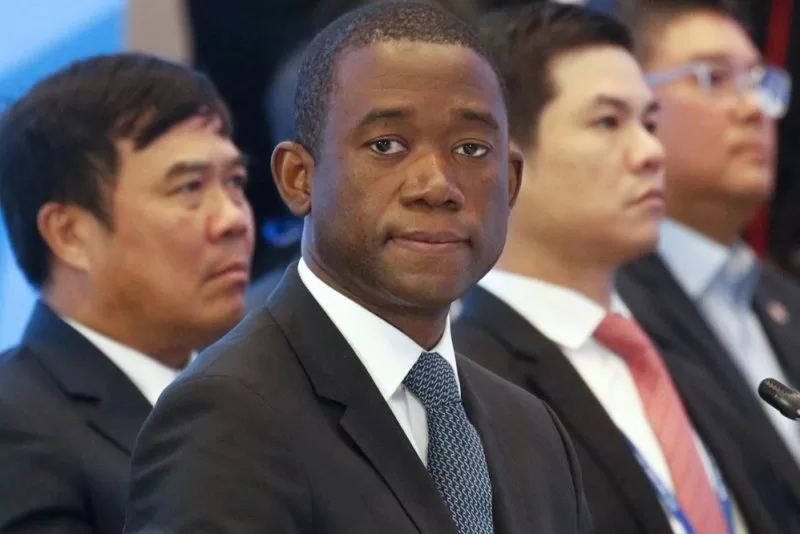“This action also targets the ability of criminal organizations like the Colombia-based CDG to operate migrant smuggling networks northwards through the Darién Gap,” a large tropical jungle that separates Central and South America, “and to America’s southern border,” Deputy Treasury Secretary Wally Adeyemo (pictured in 2022 in Thailand) said Tuesday. File Photo by Rungroj Yongrit/EPA-EFE
Sept. 24 (UPI) — The U.S. Treasury announced a series of new political sanctions on businesses in Mexico and citizens of Colombia allegedly tied to a “significant” flow of illicit drugs into the United States and human trafficking, according to the department.
On Tuesday, the government revealed dual U.S.-based sanctions were placed on two known drug cartel families: the leadership of Colombia’s Clan Del Golfo and businesses owned in Mexico by alleged fentanyl traffickers known as the Sinaloa Cartel.
Clan del Golfo, also known as Los Urabeños, is one of America’s largest drug trafficking organizations and “a key contributor” to human smuggling, Treasury says.
“This action also targets the ability of criminal organizations like the Colombia-based CDG to operate migrant smuggling networks northwards through the Darién Gap,” a large tropical jungle that separates Central and South America, “and to America’s southern border,” Deputy Treasury Secretary Wally Adeyemo said in a news release on Tuesday.
The Sinaloa Cartel fentanyl traffickers, however, were described by the government as “one of the most notorious and pervasive” drug-trafficking organizations in the world allegedly responsible for “a significant portion” of illicit fentanyl and other deadly drugs trafficked into the United States.
According to the department, Treasury plays “a leading role” in countering the trafficking of fentanyl and other illicit drugs.
Treasury’s Office of Foreign Assets Control, which has worked with authorities in Mexico and Colombia “for decades,” Treasury added, coordinated with with the federal DEA, Colombian National Police and Mexico’s Unidad de Inteligencia Financiera.
Some in the handful of Colombia’s Del Golfo clan, described by Treasury as “a significant” trafficker of foreign narcotics, were targeted by U.S. sanctions but remain at large.
The department said CDG, with its power base in the Uraba region of northwest Colombia, relies on drug trafficking activities and” a military-style framework” to maintain operability smuggling illegal drugs via water to Panama, Mexico and other surrounding countries.
Last year in August, a federal grand jury in Florida’s Southern District charged Jose Miguel Demoya Hernandez with cocaine trafficking with intent to distribute to the United States. He also is wanted by the Colombian government for his alleged CDG involvement.
And considered CDG’s “top financial chief,” sanctions also were put on Alexander Celis Durang, who was indicted in March 2021 by a federal grand jury in Texas’ East District for cocaine trafficking, was arrested last year by Colombian authorities and currently is waiting on extradition to the United States.
The Office of Foreign Assets Control also sanctioned Jose Gonzalo Sanchez Sanchez, who is known by the U.S. to be the drug trafficking clan’s “second-in-command.”
Additionally, sanctions were put on Jose Emilson Cordoba Quinto and Wilder de Jesus Alcaraz Morales. The U.S. contends the two are guilty for control of migrant flows through the Darién Gap and transport of drugs through CDG territory. Colombian authorities have offered a little more than $12,000 for their capture.
Treasury has sanctioned more than 350 targets over the last two years for alleged involvement in drug trafficking activities at all supply chain stages — from major cartel leaders to “under-the-radar labs, transportation network and chemical suppliers,” officials say.
This week, OFAC Acting Director Lisa Palluconi’s will visit Colombia and Mexico to “further strengthen Treasury’s regional ties, promote sanctions compliance and safeguard the financial system from the proceeds of illicit drugs,” Treasury said.
Meanwhile on Tuesday, OFAC also sanctioned Mexican-based business “Nieves y Paletas EVI” for allegedly being “owned, controlled, directed by or having acted or directly or indirectly reported to act on behalf of Mexico’s Sinaloa Carteln in sanctions placed on Jesus Norberto Larranaga Herrera, and his wife, Karla Gabriela Lizarraga Sanchez.
According to U.S. officials, Nieves y Paletas EVI operates as a frozen dessert business with “several” storefront locations in Culiacan and the surrounding Mexican communities such as Pueblos Unidos and Tacuichamona.
Jose Arnoldo Morgan Huert joins the other two as the owner of “Farmacia y Mini Super Trinidad,” which is a retail pharmacy and supermarket in Nogales, Sonora.
He is the brother of Sinaloa Cartel “plaza boss” Juan Carlos Morgan Huerta, who allegedly manages cartel operations in Nogales and oversees trafficking of multi-ton quantities of drugs such as cocaine, heroin, methamphetamine and fentanyl and was indicted by a federal court in the U.S. District of Columbia. He remains a fugitive from the law.
Addiction affects two-thirds of Americans, a survey last year revealed.
OFAC coordinated the multi-agency Mexico response between the FBI, DEA, the Homeland Security Investigations’ Tucson Office and the Pima County Sheriff’s Department.
The U.S. sanctions largely affect those attempting to travel to or from the U.S. with property or any other business or financial interest in the United States, and prohibits American citizens from engaging under threat of penalty.
Tuesday’s action by the U.S. government was part of a “whole-of-government effort ” to counter the global threat posed by illicit drug trafficking causing the deaths of tens of thousands of Americans annually.
Last month, the Treasury placed sanctions on Haiti’s former President Michel Joseph Martelly, after allegations he abused his power in order to take part in international drug trafficking and money laundering, and had at least attempted to facilitate the trade of illicit drugs on a global scale and into the U.S. market.

